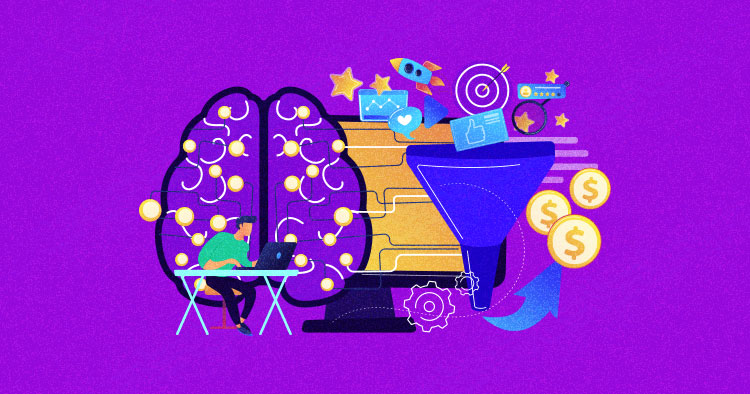
We understand the significance of integrating artificial intelligence tools to ramp up your ecommerce store and increase your sales in 2023.
According to Geoff Hueter, CTO Certona, “AI has been powering retail for years, and retailers have only been scratching the surface of what’s possible. A combination of the right solutions and an intelligent approach to adoption and data management will help all retailers reap the benefits of AI.”
When you are an ecommerce store owner, all you want to do is improve conversions while saving both your cost and time. This is where artificial intelligence for ecommerce comes into place.
Everything seems to be evolving really fast in the post-pandemic world. Artificial intelligence takes the ecommerce game one step ahead from mobile ecommerce apps. While we are already seeing chatbots and personal assistants making our buying experiences better, there are other tools for artificial intelligence as well that can make business for online retailers profitable and a lot easier as well!
If you are using WooCommerce, here is a guide that can help you with automating your WooCommerce store.
Since AI has become the need of the hour, we need to know how important it is to leverage artificial intelligence for maximum ecommerce gains. So, without further ado, let’s first understand the benefits of using artificial intelligence in ecommerce.
Want to Skip the Details? Go Straight to the List of Top Artificial Intelligence Tools
The Benefits of Using Artificial Intelligence in Ecommerce
Using artificial intelligence tools in ecommerce creates a domino effect where one benefit leads to another. This is incredibly great for the profitability and conversion of your store.
Some benefits of using artificial intelligence tools and applications in ecommerce are:
Personalized and Interactive Buying Experiences
AI tools help store owners view customer preferences in real-time. This not only creates relevance and generates interest for customers, but also provides them with specialized, reliable, and peronalized shopping experiences, which will make them come back to your store. How does it do so? By providing relevant product recommendations unique to each shopper.
Take AliExpress for instance. They are making the best use of AI and use personalized marketing to provide each shopper a different set of products on the store’s frontpage according to their individual needs and preferences.
Ecommerce Platforms Can Forecast Future Demands
Ecommerce store owners can conveniently check and analyze their website’s inventory needs and consumption patterns with artificial intelligence tools. This is super helpful in determining which products sell the most, and which don’t make up for that many conversions. Online store owners can then anticipate, predict, and pre-plan product demands. This increases efficiency, and also boosts the store’s performance.
Credit Card Fraud Risk Management
By using artificial intelligence tools, ecommerce store owners can ensure secure online payments. They are able to do this by using machine learning technologies to identify and understand the potential possible fraudulent credit card transactions.
AI Assistance in Offering the Best Pricing
Ecommerce platforms can use AI pricing tools that are powered by big data and machine learning algorithms to sell their products at the best pricing. These tools also help in predicting future prices by taking into account various factors such as inventory, as well as the demand and supply trends.
The Functional Areas Where AI Tools Can Help Ecommerce Store Owners
Now that you have understood what benefits you can achieve by using AI tools, let’s look at how these can enhance the functionality of your ecommerce store and boost its overall performance.
The following are some ways in which artificial intelligence tools boost your store’s functionality.
- Improves customer interactions and user experience through smart widgets
- Enables visual search that helps shoppers find a product or similar products by taking a picture on their phones – the AI tool picks these products by analyzing, color, texture, shape and any other additional details spotted in the product picture
- Helps customers try-on products virtually – L’oreal’s Modiface and Chanel are great examples and both are driving great sales
Top 10 Artificial Intelligence Tools for Business Growth
In order to help you select the best artificial intelligence tool for your ecommerce store, we have compiled a list of 10 top artificial intelligence tools that are the most useful for your business. All of them have some great features to offer that may take your ecommerce store to the next level.
1. TUP e-Commerce

TUP Solutions works on all ecommerce platforms including WooCommerce, Shopify, and Magento. It offers two ecommerce specific solutions to assist ecommerce store owners: Revenue Optimization and Persona Identification.
Revenue Optimization
We’ll talk about Revenue Optimization first. In this program, TUP automates UX changes to increase revenue. This means they bring your data together, examine it from campaigns to conversions, and identify the best selling personas. This is called their multivariate analysis, and using it they provide ecommerce store owners persona-specific, real-time, and revenue optimized styling which takes buyer experience to the next level.
The three steps in which the Revenue Optimization model work are the following:
- 30-minute meeting to set things up and gather data in one place: adding TUP tag to your source code or GTM, adding TUP to your Google Analytics, labeling pages and cart elements, and installing the TUP Chrome extension to see the most clicked elements. In 5-10 days, you will start seeing patterns and getting insights.
- Identifying personas by using the aggregated data to discover the most converting target audience and their behaviors.
- Optimizing and personalizing your website – you see insights on the dashboard, so you can better personalize and refine your campaigns – you just have to add the tag to the header of your source code, send your campaign data, and then you can discover your top converting personas.
Persona Identification
Another TUP program specific to ecommerce is Persona Identification. This program helps ecommerce store owners learn which of their efforts are the most converting. It identifies and shows you which campaign element, on-site promo, or demographic earns you the most revenue.
As part of this program, TUP assesses the preferences, behaviors, and characteristics of your website visitors. You can use all of this information to create persona-specific user flows, refine your brand, improve your online store’s design, and streamline campaigns while increasing your ROAs.
The Persona Identification model flows in the following manner:
- Tracks and maps your visitors journey on your ecommerce store
- Discovers the correlation between demographics, behaviors, digital campaigns, cart size, conversion rate, UX, user flow, personas etc.
- Gives a detailed analysis of your top 5 buying personas and gives you all the data in your dashboard from where you can segment your visitors according to different factors like demographic, location, time, day, weather, and date range etc.
The best part is, TUP will help you connect Google Analytics and install their tag by walking you through these things in a one-on-one 30-mins meeting so you wouldn’t have to deal with technical stuff alone.
TUP offers a three-tiered pricing structure that goes as follows:
- Persona Identification – $1999
- Persona Optimization with Multivariate Testing – ongoing, billed-monthly, $0.02/ session or 10% of the lift or monthly revenue required (minimum $50k per month)
- SaaS platform optimization and personalization – $7500
2. Seventh Sense

Seventh Sense is an artificial intelligence software that can ramp up the performance of your email marketing campaigns. It can also boost engagement for your ecommerce store.
This AI email marketing tool can benefit you in more than one way. Email inboxes are so noisy that it is important for you to break through the clutter by using artificial intelligence to deliver your emails and provide analytics.
Seventh Sense supports Hubspot and Marketo, and offers the following features that may help you get the most engagement:
- Send time optimization – this delivers email to every individual at their most optimal engagement time.
- Email throttling – this speeds up the email delivery process
- Email frequency optimization – segmentation lets you email customers at their preferred frequency
The benefits of these features are happier customers, shorter sales cycles, and higher conversions. As for the pricing, it differs for both Hubspot and Marketo:
- For Hubspot: $64-$80/month for business model, custom price for enterprise model
- For Marketo: $360-$450/month for business model, custom price for enterprise model
See How Cloudways Helped Aelia.co Cut Down Its Hosting Cost and Improve Load Time
3. Granify

Granify offers easy and quick machine-learning revenue optimization for ecommerce store owners. It works in a fairly simple manner. As your customers interact with your ecommerce store, Granify collects around 500 behavioral data points per second. It then uses this data to compare with billions of other customer behavioral patterns to calculate the customers’ probability of conversions.
Working like this, Granify can send your customers optimal messages when it identifies a conversion opportunity, which leads to increased revenue for your store. Its predictive analysis helps ecommerce store owners serve each customer with the products they need and want..
You can ask them for the pricing by using the contact form on their website. For now, the exact estimate of the fee they charge is undisclosed.
4. Namogoo

Namogoo helps ecommerce store owners boost their revenues by identifying lost revenue opportunities through artificial intelligence. It not only does this on your ecommerce store’s website but also on your app.
By smoothing your customers’ digital journey, it removes any roadblocks and hesitations, so that customers follow a clear and straight path to checkout easily and conveniently. This will increase your sales and convince your customers to return for more purchases on your online store.
As a digital journey continuity platform, Namogoo uses machine learning to understand your customers in and out to deliver individualized promotions, manage coupons and price-checking extensions, prevent competitors from hijacking your customers, and more.
When it comes to pricing, Namogoo has flexible plans for small to enterprise businesses. You can get in touch with them to find out what plan is best for your ecommerce store.
5. PriSync

PriSync lets ecommerce store owners find their rivals’ pricing, strategies, and profit margins, which helps them increase their sales and revenue.
PriSync works in a highly efficient manner. The three steps by which you can easily set it up and use it are as follows:
- Add your products and define them. You can add them separately, or all at once. Then add in your competitors to your dashboard as well.
- Once you have added your products and competitors, you can go to your dashboard and see the price changes in your market. You can discover past price trends and export all the data you want relevant to pricing to an excel sheet.
- You have the pricing data, trends, indexes, etc., so you can easily leverage them to increase your market share by being up to date and competitive.
PriSync also has a very proactive and dedicated customer service, shows accurate and up-to-date data, and offers flexible pricing to its customers. The pricing plan starts from $59 per month. It follows a three-tiered pricing structure:
- Professional: $59/month
- Premium: $129/month + API access (charged 20% of the monthly fee)
- Platinum: $229/month + API access (charged 20% of the monthly fee)
- Custom pricing if you want to track the pricing of over 5000 products
6. Morphl.io

Morphl.io is an open, accessible, and easy-to-use artificial intelligence platform. Using machine learning, it predicts customer behavior by studying customer behavior patterns and insights to give highly personalized product recommendations, discounts, email notifications, and increased marketing ROI.
Some of the ways Morphl works are:
- It processes a large volume of signals including your customer’s activity, browsed products, searches, number of sessions, time on page etc.
- It focuses on specific targeting methods to group your customers into segments so you can better direct your marketing efforts.
- By tailoring the online shopping experience for each individual, it helps you make better decisions, reduce guesswork, and optimize your marketing process.
Morphl also offers a suite of machine learning models to facilitate your ecommerce store: shopping stage to tap promising customers, customer LTV to offer more appropriate upselling offers by understanding the buying power of customers, and more.
Morphl’s has three different pricing plans, billed monthly or annually:
- Essential: $149-$179/month
- Professional: $499-$599/month
- Enterprise: $999-$1,199/month
Improve Your Store’s Performance with Ecommerce Hosting
Our managed Ecommerce hosting is best for online stores looking for a fast, secure, and scalable platform.
7. NeoWize

NeoWize follows an active, data-driven approach and thus continuously seeks to develop advanced active algorithms that take machine learning to the next level. It is also known as an industry leader in ecommerce, and uses its technological capabilities like machine learning, neural networks, and adaptive input to extract the most out of the available data.
It offers personalization of your store, business intelligence, and also insights and analytics. The pricing is undisclosed and can be found out by reaching out to them through their website.
8. ViSenze

ViSenze increases the product discoverability of your ecommerce store. It improves the way your customers search for a product by using visual AI and rich catalog data, making sure customers don’t flee your store because of not finding their desired product.
ViSenze promises to make visual search 9x faster than text search, increase conversion rate by 6x, and ROI by 29x. It not only offers good SEO and advanced product search features, but also provides contextual product recommendations, and customer insights. Moreover, with contextual advertising, it helps ecommerce store owners create highly relevant ads that match the styles and trends customers are actively exploring.
ViSenze currently helps big ecommerce brands like Mango, dfs, Zalora etc. It uses extremely smart technology to create an excellent experience for your ecommerce customers.
9. Liveperson

Liveperson is a smart artificial intelligence tool that bridges the conversation gap between you and your potential customers. It is an innovative initiative that improves brand-to-customer conversations through an AI-powered conversational cloud.
Apart from improving conversations, it also makes it incredibly simple for customers to make a purchase on the messaging channels they are comfortable using in their everyday life.
As for the pricing, it is undisclosed at the moment. But Liveperson offers a variety of tools and products like Intent Manager, AI Annotator, Conversational AI, Conversation Builder, Conversation Manager, Conversation Analytics, Conversation Orchestrator, Social Messaging and more that you can read more about on their website and inquire for pricing and demo.
10. Phrasee

Phrasee is an AI tool designed to facilitate your ecommerce marketing efforts. You automate brand standards and sound that is unique to your brand. It helps you optimize your brand language and create a very personal and connected customer journey that drives sales for your ecommerce store.
Peronalizing and optimizing your brand language through Phrasee would create increased brand awareness, and social following. More than that, it will increase engagement by reaching out to customers in real-time with personalized messaging. This AI tool will also decrease your bounce rate by sending your customers personalized messages when they are at the most critical point of their customer journey.
Phrasee also gives you access to tools like opportunity cost calculator, subject line analyzer, and split test calculator, and some power features like Phrasee Brain and Phrasee Score to help ecommerce marketers automate language in real-time, while also taking advantage of AI-powered metric for email marketing.
Conclusion
Now that you have learned about the best artificial intelligence tools that you can use to boost your ecommerce store, you can automate the most critical points of your customer’s online journey and improve customer experience.
It would work wonders for you if you take an additional step to ensure your ecommerce store is hosted on a fast, flexible, and scalable infrastructure that is manageable as well. This will help you focus more on automating your ecommerce store.
Which of the above tools for artificial intelligence do you think is the most suited for your business? Have you tried WooCommerce hosting for your ecommerce store? To learn more about what WooCommerce can do for your ecommerce store, read our blog on how to setup woocommerce store. If you want to migrate to WooCommerce, our blog section has a complete series on how to do that as well.
To find more ecommerce tools and plugins, you might want to read the following helpful articles:
- 12 Best WooCommerce Email Customizer Plugins in 2023
- 20+ Must-Have WooCommerce Plugins to Supercharge Your Online Store in 2023
- Best WooCommerce Checkout Manager Plugins to Choose in 2023
- 7 Top WooCommerce SEO Plugins For 2023
- WooCommerce vs Shopify: Ecommerce Face-off (2023 Comparison)
- How to Migrate Shopify to WooCommerce: A Step-by-Step Guide
Q1. What are some other AI tools and frameworks?
Some other important tools and frameworks apart from the ones we have mentioned in our article are as follows:
- Scikit Learn
- TensorFlow
- Theano
- Caffe
- MxNet
- Keras
- PyTorch
Q2. What is the most popular AI tool?
The main AI tools and frameworks that are popular and used almost everyday are Amazon, Google Assistant, Alexa, Cortana, Infosys Nia, Siri, etc.
Q3. What can AI do today?
AI can help humans in a number of ways. With a machine to display capabilities such as learning, reasoning, creativity, and planning, humans are able to focus on the growth and expansion of their business and be a lot more productive. AI has enhanced human efficiency, and AI frameworks enable technical systems to understand their environment, deal with the data they read, solve problems, and create and give responses to achieve a specific goal.


